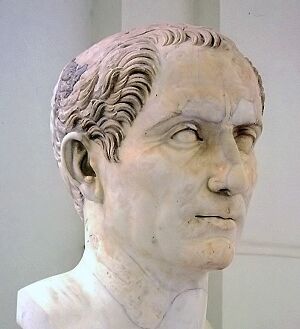Gaius Julius Caesar
July 12, 100 BCE – March 15, 44 BCE

While he is arguably the figure from ancient Rome most familiar to the general public today, it is a common misconception that the legendary general, politician, and writer Gaius Julius Caesar was the first ruler of the Roman Empire. Even though Suetonius begins his narrative with the life of Caesar, the distinction of being the first emperor would go to his nephew and adopted heir, Augustus.
Born to one of the oldest patrician families in Rome, Caesar was well-connected politically. His uncle Gaius Marius was a formidable general and powerful politician, whose military reforms laid the groundwork for the conquests to come. However, Caesar began his adult life amidst the backdrop of bitter partisan rivalry that often turned violent, and to save his life and the fortunes of his family, Marius had Caesar nominated to the priesthood. This was unwelcome news to the ambitious and energetic Caesar, whose career options now seemed circumscribed by extraordinarily strict religious rules and taboos. But when Marius’ former protege and chief rival, Lucius Cornelius Sulla, finally defeated the populist Marian faction, he punished Caesar by (among other things) stripping him of his priesthood.
This, ironically enough, set in motion the course of history for which Caesar is known even to this day.
In 60 BCE, Caesar, Marcus Licinius Crassus, and Gnaeus Pompeius Magnus (Pompey the Great) formed the First Triumvirate. They were opposed by conservatives within the Roman Senate.
Caesar’s Gallic War exploits extended Rome’s territory dramatically and earned him unmatched military power and popularity with the Roman people. Pompey aligned himself with the Senate after the death of Crassus in order to eclipse Caesar. When the Senate ordered Julius Caesar to return to Rome without his army, he refused, and instead crossed the Rubicon River in northern Italy with a legion in 49 BCE. In doing so, Julius Caesar ignited a civil war that he eventually won.
After his victory, Caesar installed himself as a dictator and began to institute a program of reforms, including the creation of the Julian calendar. His senatorial enemies, led by his former protege (and rumored illegitimate son) Marcus Junius Brutus, conspired to assassinate Julius Caesar on the Ides of March (15 March) 44 BCE.
Caesar’s death ignited a new civil war. The Roman Republic was never restored.
Much of what we know of the life and conquests of Julius Caesar comes from the writings of Suetonius and Plutarch. Considered one of the greatest military commanders in history, Caesar’s military conquests and political willpower shaped the course of European and world politics for centuries.
After his passing the title “Caesar” remained in use. The Russian word “Tsar” and the German word “Kaiser” are modern derivatives.
Timeline of Important Events During the Life of Julius Caesar
- 62 BCE – Julius Caesar is elected praetor.
- 59 BCE – Caesar elected consul and the First Triumvirate is formed with Marcus Licinius Crassus and Gnaeus Pompeius Magnus. Lex Vatinia is passed, which gives Caesar the governorship of Cisalpine Gaul and Illyricum.
- 58- 51 BCE – Julius Caesar carries out war against the Gauls.
- 58 BCE – Cicero is exiled. Clodius annexes Cyprus. Caeser defeats Helvetii and Ariovistus.
- 57 BCE – Caesar subdues the tribes of the Belgae.
- 55 BCE – Julius Caesar defeats two German tribes and then crosses the Rhine to invade Germania.
- 54 BCE – Caesar invades Britannia. Crassus prepared for war against Parthia.
- 52 BCE – Caesar lays siege to Alesia, trapping 100,000 Gauls within their fortifications.
- 49-45 BCE – Civil War between Caesar and the Republican forces of Pompey.
- 49 BCE – Caesar crosses the Rubicon. Caesar surrounds the Pompeian commander, L. Domitius Ahenobarbus, and three legions at Corfinium.
- 48 BCE – Caesar’s forces are held at bay at the Batte of Dyrrachium, but then go on to defeat Pompey at Pharsalus.
- 47 BCE – While in Alexandria to sort out the dynastic dispute between the Ptolemies, Julius Caesar is attacked and trapped in the palace quarter of Alexandria by the young king Ptolemy XII. At the Battle of Zela, Caesar and his army face off against the forces of Pharnaces II of Pontus. Upon the conclusion of this campaign, Caesar utters the famous phrase “Veni, vidi, vici” (I came, I saw, I conquered). The tenth legion, which Caesar commanded during the Gallic Wars, mutinies and marches on Rome. Caesar puts an end to the mutiny.
- 46 BCE – At the Battle of Thapsus in Africa, Caesar destroys the Pompeian garrison under the command of Q. Metellus Scipio. Julius Caesar reforms the Roman calendar.
- 44 BCE – Caesar is murdered by Brutus, Cassius, and other co-conspirators.